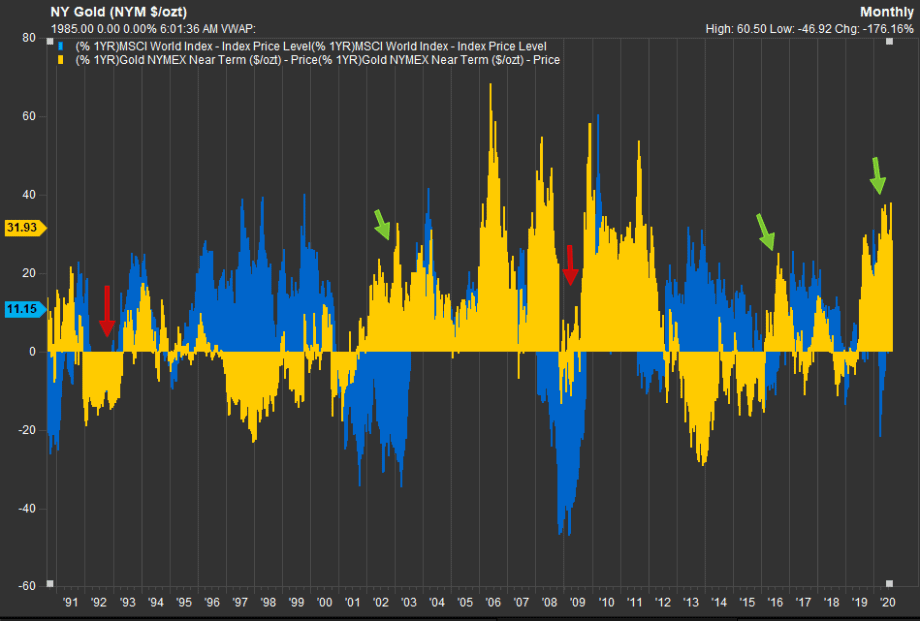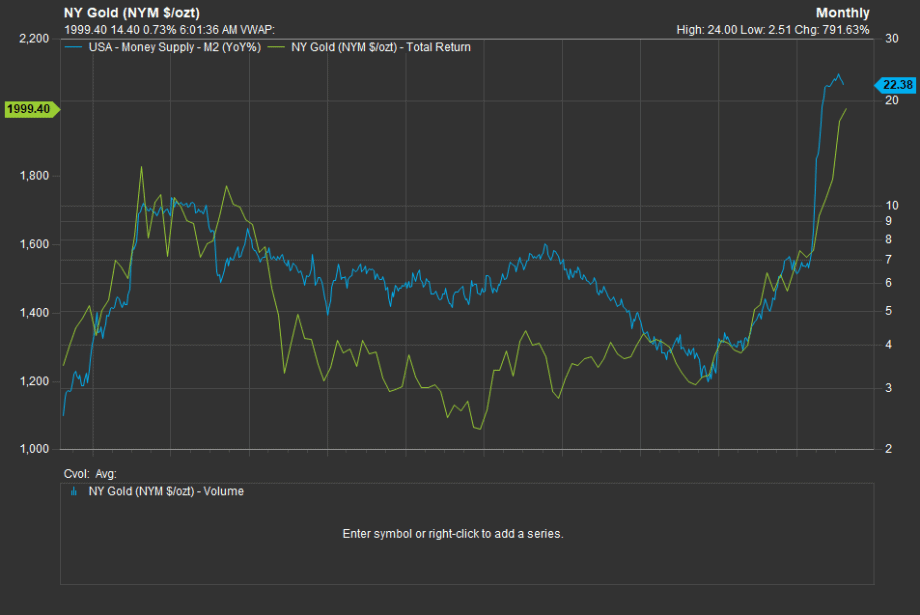The market crashed, you jumped on the rookie investor wagon, made a bit of money, and thought, 'investing is easy.' You've now got a little lump sum, have heard the rumours the thing is a peach about to go putrid, and are keen to put your dollars somewhere safe (and lucrative).
With headlines like "technology and gold stocks poised to storm ASX indexes: Morgan Stanley" (AFR) and with uncertainty being the only constant feature of 2020, the clear choice in this crazy market is gold, right? Wrong. Or at least – it's not that clear cut.
Luke Laretive, CEO of Seneca Financial Solutions told DMARGE gold doesn't typically provide as many returns as stocks: "Over 30 years, the MSCI All World stock index has returned 1101%. Or $1,000 invested at the end of Aug 1990 is now worth $1,100,000. $1,000 invested in gold is only worth $585,000."
"So as a pure investment, if you could only pick one, you’d be buying stocks every single time."
Of course – that's not why people buy gold – it's a way to provide yourself with some coverage in the case of a market crash. As Laretive puts it: "as a hedge to reduce portfolio volatility, it's occasionally effective."
"Here are monthly returns for both across the same 30 years. I’ve put red arrows where it didn’t work as a hedge against a falling market and green arrows where it did."

"Gold is used primarily as a store of wealth," Laretive told us, "when inflation is expected to be high."
What about right now though? Is gold still a safe bet? Laretive told us: "Gold price has been driven higher by investors looking to hedge/speculate on future expected inflation (resultant from current stimulus measures from central banks, governments). If that inflation doesn’t eventuate, or the expectation of that inflation arriving fades, you’d expect the gold price to fade with them."
"Conversely, if inflation surprises to the upside, then perhaps gold does better. This chart probably shows it best, US Money Supply year on year percentage vs gold price."

The cautionary tale here, according to Laretive, is that gold is correlated with high volatility in stock prices – as it's used as a safe haven asset. As a result, "if inflation expectations rise, revenue/earnings growth expectations rise – which may drive a more risk-on sentiment (stock markets go up) and hold back gold prices," Laretive told us.
"Further, gold and the USD are also inversely related. A weakening USD is also positive for gold, though I’d argue this may already be incorporated in the price (as the below chart demonstrates)."

This all in mind, Laretive has two warnings for rookie investors putting all their money into gold: "there’s plenty of instances where gold is associated with the markets going up and offers little in the way of downside protection. So you might be wrong in two ways. One: the market might keep going up and gold underperforms. Two: market goes down and gold goes down with it (like many times in history previously)."
In other words: it's a useful hedge, and potentially an important aspect of a balanced portfolio, but not a silver bullet, and not a place where you should put everything.
As Albert Cheng, CEO of Singapore Bullion Market Association, told CNBC earlier this year, with the high entry fees you see when gold is on a tear, the question is not when to buy gold, but how much?
“There is no good time to buy gold... [but] every investor should have some gold in their portfolio.”
"Typically, financial advisors recommend a gold allocation of 1% to 5% of an individuals’ overall portfolio. Cheng said that could shift higher from 5% to 15%," (CNBC).
Hell, even Warren Buffet, who is known for his 'investing in gold is betting against America' stance, has recently, allegedly, started dipping his pinky in the pool of gold.
As for the signs you should be looking for when it comes to cashing out of gold and quitting while you’re ahead (if you are one of those rookie investors who just went ahead and bought one big fat gold ETF), Laretive says gold investors should keep an eye out for: "The US Dollar Index (falling), Yield Curve, US Money Supply (accelerating) and the VIX (increasing)."
Laretive's overall advice for a rookie investor with, say, a lump sum of AU $5,000 to play with?
"Invest in a portfolio of businesses with sustainable competitive advantage, trustworthy management, attractive valuation and structural industry tailwinds. And then get on with being good at your job/growing your business and saving your money."
The ball is in your court.
This article is of a general nature only and does not consider your objectives, financial situation or needs. You should consider the appropriateness of the information in light of your objectives, financial situation and needs before acting on it and obtain copies of any relevant disclosure documents. Seneca Financial Solutions does not warrant the accuracy or reliability of the information in this report. Luke Laretive, Seneca Financial Solutions, it’s Directors and it’s associated entities may have or had interests in companies mentioned. They may have or have had a relationship with or may provide or has provided investment banking, capital markets and/or other financial services to those companies mentioned.
Luke provides clients with a daily note, which you can access here.
Read Next
- Expert Reveals The Real Reason Tesla Stocks Spiked... & It's Not Pretty
- Hidden Warning Behind The 'Best Finance Tweet Of 2020'
Subscribe to the DMARGE newsletter
Follow DMARGE on Instagram
Follow DMARGE on Facebook
The post Finance Expert’s Warning For Australians Investing In Gold appeared first on DMARGE.
from DMARGE https://ift.tt/3hfHUGI








0 comments:
Post a Comment